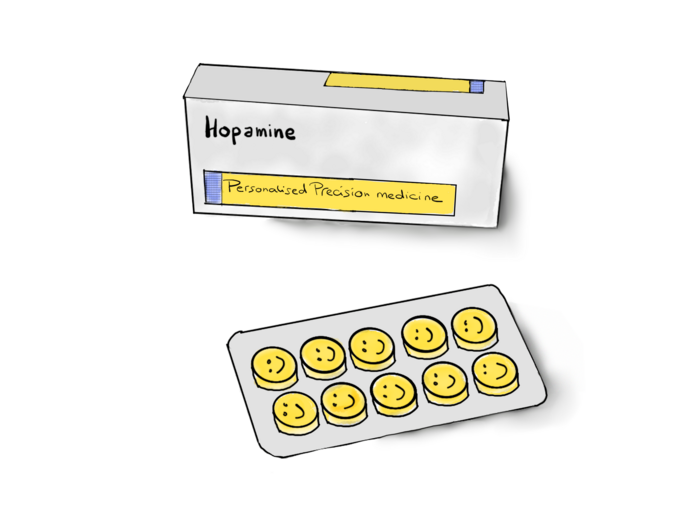Amsterdam, March 23, 2023 – When Marina Noordegraaf was diagnosed with Parkinson’s disease at age 49, she noticed when it came to treatment decisions, she sometimes felt powerless. She observed that she herself played an active role in communicating her hopes and wishes to her healthcare professionals, which were not automatically taken into account. She took back control by taking her own hope seriously, prescribing her own recipe of “hopamine,” a self-invented word representing the uniquely personal set of hopes, desires, experiences, and skills of each individual with Parkinson’s disease, which is caused by a dopamine deficit.

Credit: Marina Noordegraaf.
Amsterdam, March 23, 2023 – When Marina Noordegraaf was diagnosed with Parkinson’s disease at age 49, she noticed when it came to treatment decisions, she sometimes felt powerless. She observed that she herself played an active role in communicating her hopes and wishes to her healthcare professionals, which were not automatically taken into account. She took back control by taking her own hope seriously, prescribing her own recipe of “hopamine,” a self-invented word representing the uniquely personal set of hopes, desires, experiences, and skills of each individual with Parkinson’s disease, which is caused by a dopamine deficit.
Marina Noordegraaf, MSc, together with a team of healthcare professionals at Radboud University Medical Centre in Nijmegen, the Netherlands, led by Professor Bastiaan R. Bloem, MD, PhD, recognized the importance of conveying the message of hopamine to the broader Parkinson’s world. In a commentary published in the Journal of Parkinson’s Disease, the authors propose that adding hopamine to the therapeutic mix can contribute to the empowerment of persons with Parkinson’s disease. They also provide practical recommendations for how medical professionals can introduce the concept of hopamine in daily clinical practice.
Senior author of the commentary and Editor-in-Chief of the Journal of Parkinson’s Disease, Professor Bloem, Radboud University Medical Centre; Donders Institute for Brain, Cognition and Behaviour; Department of Neurology; and Centre of Expertise for Parkinson & Movement Disorders, Nijmegen, The Netherlands, explained, “Owing to the Marina’s experiences, this commentary stresses the importance for us as healthcare professionals to continuously stay curious, pause and tune in to the person with Parkinson’s for whom we are caring. We need to invite and encourage our patients to formulate their own personalized recipe of hopamine.”
Hopamine reflects each person with Parkinson’s unique personal characteristics. Hopamine really supplements the term dopamine, as a reflection of each person’s unique physical characteristics. Instead of merely prescribing dopamine replacement medication that places the fate of the diagnosed individual primarily in the hands of medical professionals, actively inviting and supporting each individual to formulate their own very personalized dose of hopamine might help avoid the risk of creating false hopes and a sense of hopelessness.
“The concept of hopamine fits well within a broader shift that is taking place within healthcare, namely that from illness to wellness, including the transition from asking ‘What is the matter with you?’ to ‘What matters to you?’” added Professor Bloem.
A recipe for hopamine might look as follows, according to first author and person with Parkinson’s Marina Noordegraaf: “I hope to see my children grow up. If I cycle on my spinning bike for half an hour every day – which I desire because there is evidence it might positively influence the course of my Parkinson’s, and which is within my reach because the spinning bike was only $30 and is patiently waiting for me at my bedside every morning when I wake up – I hope it will slow down my Parkinson’s progression and enable me to see my children grow up.”
Parkinson’s is a complex disease with variations in presentation for different individuals. In addition to different symptoms, every person with Parkinson’s has different hopes, wishes and abilities. Therefore, in order to formulate a personalized care plan, healthcare professionals need to look through both the dopamine and the hopamine lens to see the person with Parkinson’s as a whole.
Co-author Sanne van den Berg, PhD, of Radboud University Medical Centre in Nijmegen, The Netherlands, commented: “Marina, who passed away in October 2022, was a fierce advocate for incorporating lived-experience of persons with Parkinson’s in both research and daily care. As part of her legacy, we hope the message of hopamine will support persons with Parkinson’s and their healthcare professionals to truly co-create personalized care.”
Parkinson’s disease is a slowly progressive disorder that affects movement, muscle control, and balance. It is the second most common age-related neurodegenerative disorder affecting about 3% of the population by the age of 65 and up to 5% of individuals over 85 years of age.
Journal
Journal of Parkinson s Disease
DOI
10.3233/JPD-230012
Method of Research
Commentary/editorial
Subject of Research
People
Article Title
Hopamine as Personalized Medicine for Persons with Parkinson’s Disease
Article Publication Date
14-Mar-2023




